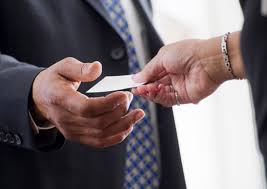 Business professor Adam Grant, writing in the New York Times, argues that business networking activities are overrated. (Grant is the author of Give and Take, one of the rare business advice books that I have actually read. It’s worthwhile.) Formalized networking events, Grant argues, are not only uncomfortable (we knew that already), but they’re ineffectual as a means of building real professional connections. Instead of using networking to seek to achieve things, he contends, we should reverse the order and use our great achievements to build a network.
Business professor Adam Grant, writing in the New York Times, argues that business networking activities are overrated. (Grant is the author of Give and Take, one of the rare business advice books that I have actually read. It’s worthwhile.) Formalized networking events, Grant argues, are not only uncomfortable (we knew that already), but they’re ineffectual as a means of building real professional connections. Instead of using networking to seek to achieve things, he contends, we should reverse the order and use our great achievements to build a network.
I have stumbled upon this wisdom, without the benefit of Grant’s column, as I have built my law practice. Far less often than I have been advised, I have done traditional networking activities, handing out my cards at cocktail events, going to meetings of a networking group, sending cold letters to small public companies, etc. I happen to know off the top of my head the exact number of clients that have resulted from these activities: zero. So how do I get clients? To illustrate, the following are the stories of how I obtained three clients that have kept me very busy in recent years (I hesitate to say “best” clients – I love all my clients!):
- A former senior corporate partner at a firm where I worked retired as an attorney and hired me to handle SEC and corporate matters for a public company for which he was an executive.
- A law school classmate and fellow associate at a big firm left the law to go into business and hired me to be corporate counsel to startup companies that he founded.
- A former big firm partner of mine referred a corporate client that was looking for representation by a smaller firm.
That’s three great clients, all obtained without awkward small talk and the handing out of a single business card. Although this seems like quite a passive approach to client development, I would argue that it involved active efforts on my part. Following the Grant model, I focused on the early part of my career not on networking (aside from the making of friends that I was doing only for its own sake) but on simply learning how to be a good lawyer and developing a reputation for reliability and responsiveness. In my travels through a few big firms, I had the chance to work with dozens of attorneys and the firms’ clients, most of whom I like to think thought I did a good job. Accordingly, when I made the decision in 2010 to start an independent practice and told everyone I knew about it via a blast email, the clients followed. And it’s an ongoing process, with some of my newer clients arising out of work I’ve done in recent years.
Accordingly, my advice to young attorneys is to, above all else, focus on doing the best job you can and impressing the people you come across. You will benefit eventually, whatever professional path you eventually take.